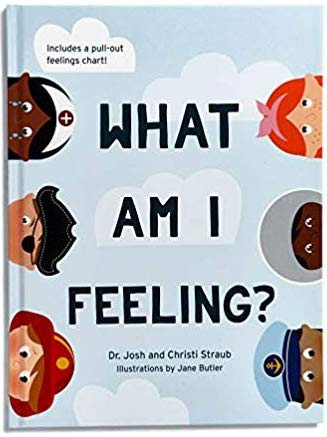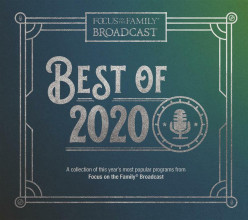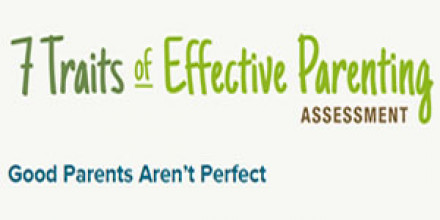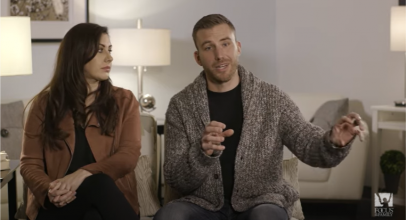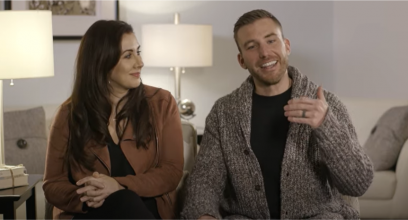(Sound effects of a laughing baby)
John Fuller: Well, if you’ve spent some time with a baby you know how quickly they can go from one very happy emotion … (sound effects of a crying baby) to something completely different.
Jim Daly: (Laughter) I think we just heard it.
John: Mm hmm. This is Focus on the Family and today we’ll explore how your feelings can have a profound impact on you, no matter how old or young you might be. Your host is Focus president and author, Jim Daly. And I’m John Fuller.
Jim: John, I think every parent can feel that. It just grabs your heart to hear that young child. And you want to say, “What can I do? What do I need to do for you?” And that’s what this program is all about today, helping parents and children learn how to moderate their emotions better and in healthy ways. And when we aired this program earlier this year, you, our listeners, you really connected with it. And this was one of our most popular broadcasts of the year.
John: In fact, Jim, we had one comment from a listener who said, “Can you write a book helping adults identify their emotions?” (Chuckling) That really would help us out as well.
Jim: Sounds like a good idea, John. There’s a lot we don’t understand about our emotions. There are some things we do know. But frankly, we’ve got to dig into that whole area of brain science and how our feelings impact us. I would add pray, too, and ask God to reveal those things to us. Sometimes emotions surprise us, like when something triggers our anger, for example. Think of that when we get triggered by anger as adults, we can kind of follow that thread to figure out what’s going on and where did that start. But children don’t understand those triggers. They don’t know why they’re angry or feeling lonely right now.
John: Yeah. And we know that God designed us to have emotions. There’s a whole range of feelings that we have. And I’m thinking of, you know, that whole fight or flight thing. That’s a God given reaction force when there’s a potentially dangerous situation.
Jim: Well, that’s right. And the Bible is filled with verses about emotion like Proverbs 15:18, which says< “A hot tempered man stirs up strife….” I remember reading this to my boys often. “… but he who is slow to anger quiets contention.” That’s one of my favorite proverbs. It’s a good one. Or Philippians 4:6. “Do not be anxious about anything but in everything by prayer and supplication, with thanksgiving, let your requests be known to God.” So if you missed this program the first time around we have a great conversation for you today that we recorded with Dr. Josh and Christi Straub that’s based on a children’s book they wrote called, What Am I Feeling?
John: And you can learn more about that book and the Straub’s at our website focusonthefamily.com/broadcast. Or give us a call. 800, the letter A, and the word FAMILY. And Jim, here’s how you began this best of 2020 conversation with Josh and Christi Straub of Focus on the Family.
Jim: Hey, guys, welcome back to Focus.
Christi Straub: Thanks for having us.
Jim: I always have to start with this ’cause Christi, you were once an institute – Focus institute.
Christi: You remember. Yes, I was.
Jim: So, you came for a semester. And it was wonderful, wasn’t it? (laughter)
Christi: Oh, like – no, but, like, it really was. We were driving in today, and I realized, you know, our kids are with us for the first time. They haven’t been to visit. And they get to be a part of this. I’m like, this is where, you know, some of our, like, best friendships really, truly started.
Josh Straub: And what’s really crazy is we’re here and we’re staying here in Colorado with one of Christi’s…
Jim: Those acquaintances.
Josh: …Best friends that she met here at the Institute.
Jim: Well, I was kidding. But, I mean, it was such a good program. We had to end that a while back, but so many – I think 5,000 students went through that program.
Christi: Did they really?
Jim: Yeah, so it was – big alumni group, so.
Christi: I lit – I said to Josh this morning as we drove in, I was like, I don’t know if I would have met him had I not come here.
Jim: Wow, that’s powerful.
Christi: It was that pivotal in my life. Like, just, you know when you hit that intersection in life and those big decision makers? I don’t think we would be here, so pretty cool.
Jim: Well, that’s a good testimony, good story.
Christi: Yeah.
Jim: We need to start with some of the terminology that you use generally, like emotional safety, emotional intelligence. I gotta confess, sometimes I’m – you know, the jazz hand thing is driving me crazy a little bit with the political correctness, I guess. But I do want to know what you mean about this and how important it is to know more about emotional safety and emotional intelligence.
Josh: Yeah, and the political correctness thing, when we truly look at what emotional safety is all about, you know when you feel safe in a relationship or when you feel threatened in a relationship and what that feels like.
And, um, it really started with us because when we were first parents, we were overwhelmed by all of the parenting, like, experts and the strategies. And, you know, you can’t even leave the hospital before you have to make a decision about immunizing your children. And then, you know, there’s the debate about spanking and not spanking and should we have our kids sleep with us or not, you know, BPA free products, gluten diet – and you’re just so overwhelmed.
Jim: You got to have a Ph.D. in parenting.
Josh: Yeah, it’s like, what the world? And so, you increase your anxiety as a parent.
Christi: Uh-hm.
Josh: And so I went back and I looked at all the research on parenting and what truly matters when – at the end of the day, when our children, like yours, 17, 19, at the end of the day, they start to launch, what would have really mattered? And over and over and over again in the research it always came back to this idea that there was a secure attachment with the parent. That there was an emotionally safe relationship with the parent.
Now I just – I want to clarify, too, because that doesn’t necessarily mean we don’t discipline our children. That doesn’t mean that they are not getting consequences for their behaviors.
Jim: Sure.
Josh: And that we’re not pushing them to challenge them. In fact, if we’re not pushing and challenging who they are, that can be termed as unsafe. So – so we want to – it’s this balance of support and challenge along the journey. And so, I think it’s important that we do define emotional safety in a healthy way.
Jim: Yeah, no, that’s really good. In one sense this topic seems, you know, pretty simple, straightforward. Um, we all have emotions and we – usually we’re able to keep those in check. So, the question I think is why is this topic important? Why should we be adding one more thing, kind of your children’s emotional stability to the list? It sounds important to me. So why would we do that?
Josh: Well, let me – let me do this first of all because I think this really is a research study that sets the tone for this.
Google, a couple of years ago, did this, um, study. They wanted to test their hiring process to see if it was working. And what they were hiring for were STEM skills – science, technology, engineering, and mathematics – which is what we train our kids for. It’s what they go to school for, is to get these hard skills. And so, they tested their most productive teams within Google. And what they found at the end of the study was that STEM skills came in dead last of their most productive teams within Google.
John: Huh
Jim: Interesting.
Josh: And the top three, uh, skills were emotional safety No. 1, empathy No. 2, and emotional intelligence No. 3. They found that it was the soft skills that were the most important as it related to outcomes.
And so, it was this idea that when we’re working on a team, there’s a sense of camaraderie. I’m not going to bully you or I’m not going to make fun of you if you have an idea that doesn’t seem to make sense. We’re going to put that idea on the table. I’m going to feel valued. We might not go with that idea, but at least we’re working as a team and there’s a sense of we’re in this together type of mentality.
Jim: Yeah, no, I like that. You know, one thing I’ve said here at Focus, you know, hire character, train competence.
Christi: Hm.
Jim: And I think character, that – those are all things that are wrapped up in character. But companies do themselves and organizations do themselves a good deed when they hire people that have character. And you can train the competence that they need.
Josh: Yeah, and when you’re a safe person, when you’re carrying that safety with you and people feel like – they feel like they’re part of your team. You can motivate them to do anything. Motivation comes out of feeling like, “I’m an important part of this team.” And those are the skills that our kids get early on that – it’s not just in their career. It’s in their closest relationships, when they go to get married, when then they go to have children, when they go…
Jim: yeah.
Josh: … like, it spans all across their relationships.
Jim: Well, the emotional side, let’s look at that. What are some consequences when we, or our children, which is the topic of our program, have unresolved emotions? What typically happens?
Christi: Well, and it’s funny because we’re talking about kids, right? We wrote this as a kid’s book. And we did it intentionally because we wanted it to get into the hands of more adults.
Jim: So, they can read it, too (laughter).
Christi: Because really, this is for us. Because so many of us grew up in a home where emotion wasn’t talked about. And a lot of us grew up in homes where certain emotions were maybe punished or dismissed or minimized. And, you know, for everyone who’s listening, I think just to take that pause, that step back, to see, like, really, where do I come in on the spectrum? Because we all come in carrying emotion. But if you ask most people today, like, how are you feeling or, you know, how are you doing, you know, we just saw you guys, how you doing? Busy, good. None of these are feelings.
Jim: Right, right.
Christi: We’re just busy. Honestly, we’re overwhelmed. We don’t really know what we’re feeling, but they’re all there under the surface. And so if we can teach adults to then teach kids, let’s dig in there, that emotion is valuable because what we find is – you know, and especially in Christian culture, I think we can look at emotion like it’s a hindrance to our, you know, sanctification and, you know, that we want to just keep it in check.
Jim: Yeah.
Christi: But what we actually find is the emotions that we leave out of check, that we maybe punish, dismiss, minimize, we, like, don’t allow in our homes or even maybe in our relationships, like take marriage. Those are the ones that have the most control over our lives. They will come out somehow and typically sideways. And this is when they come out in misbehavior in kids. They come out in tantrums. They come out in maybe depression, addictive behaviors. If you’re scrolling Instagram, if you’re a workaholic, if you’re turning to alcohol or drugs. There could be a reason that we go to these
– what we call – numbing behaviors. We’re just trying to numb something that we can’t name.
Jim: Right. Right. It’s not that easy. Or you can hear that, but you can’t make it happen.
Christi: Yeah.
Jim: I mean, that’s why counselors are in business, right? Because they’re trying to help people cope with those wounds.
Josh: And one of the other factors with that, too, is a number of years ago I was work… counseling a juvenile delinquent.
Jim: I was gonna ask you about that.
Josh: Yeah. My job was to help them have remorse on their victims. But the reality was they didn’t even know what they were feeling.
Christi: Mm-hm.
Josh: Let alone to be able to help them step into the shoes of the person that they victimized and understand what they’re feeling. It had to start. So, the very first thing that I would do is I would give them a feelings chart with these faces on it…
Jim: Right.
Josh: … so they could begin to identify. Because in most cases any juvenile delinquent that I sat with, they either didn’t know who their father was or they had a very, very strained relationship with their dad. And so, they didn’t have a male figure to help them kind of navigate what emotions were like in their life.
John: You’re listening to one of our Best of Focus on the Family broadcasts with Jim Daly. And our guests are Dr. Josh and Christi Straub who’ve written a really wonderful children’s book. It’s called, What Am I Feeling? And I’ll urge you to check out the book and our entire collection of Best of 2020 broadcasts at focusonthefamily.com/broadcast. And while you’re there, look for our free Parenting Assessment, as well.
Let’s go ahead and continue listening now to more from Dr. Josh and Christi Straub.
Jim: Christi, you designed this book to help young children identify their emotional responses. And this came from, I think, a real-life situation that you had with your son Landon. And it’s a cute story. What happened?
Christi: Yeah, we – I mean, we’re just average parents. (Laughter) And we – and I mean that in every sense. Like, we – we were sending our son – he was going to a new school at the time. And he was just experiencing a ton of weird emotional reaction. Like, that we really couldn’t pin down. He was crying in the mornings. He was begging us not to go. He was having weird even just, like, physical reactions in his body. And finally, one day, you know, and we’re trying to be the courageous parents that are like, we can do hard things. (Laughter) You know, we would never send you to a school that we didn’t believe in and where you weren’t safe. And… and nothing was helping, honestly.
Jim: Yeah. Right.
Christi: It was getting worse. And so, one morning I said, “Like Landon, what does it feel like?” And he looked at me. And he said, “Mom, I feel flippy in my tummy.” And I was like…
Jim: Slippy in your tummy.
Christi: …Flippy.
Jim: Oh, flippy in your tummy.
Christi: Flippy in my tummy. And I thought, that’s fear. It’s just straight out fear…
Jim: Oh, yeah, it’s that gut fear.
Christi: …It’s that butterflies in the stomach, however we describe it. But this is coming from a kid’s description of what an emotion feels like in your body, right? Because emotions, I mean, they feel big to us.
Jim: Yeah.
Christi: They can literally overwhelm our lives as adults. As kids, I mean, they’re experiencing really big feelings inside little bodies. And until we give them language that helps them put it in a box, really, which is what that, um, emotions chart does. It gives them another face to look at to say, yes, that – that right there, you know, when your cheeks get hot, you feel flippy in your tummy, that’s fear. Oh, OK. So, it’s like teaching your kid what blue is. We just have to teach them what the color blue is and have a box for that. And it’s the same for emotion. And it helps them organize what feels chaotic and probably really scary.
Jim: Well, organize and manage…
Christi: Yes.
Jim: …Which is the key in my opinion, and help them understand what they’re feeling and how to cope with it, right?
Christi: Exactly because this is where I think we can, like, we get this spectrum – right? – of parenting where then it becomes this permissive, like, whatever you’re feeling is OK, and we’ll just let you throw a temper tantrum on the floor of the grocery store because you just need to emote. (Laughs) That is not what we’re saying. And one of my favorite lines in the book is a feeling is just a feeling. It’s not in charge of you. And this is where we get to take…
Jim: That is good.
Christi: …I know.
Jim: Say it again.
Christi: For all of us, right? (Laughter) Like, how many times a day do I need to hear that?
A feeling is just a feeling. It’s not in charge of you. Because when we give feelings a name, when we organize and can understand in our little brains or our bigger kid brains what – what we’re feeling, if it’s depression, if it’s anxiety, if it’s fear, um, if it’s sadness, we at least can start to organize and then we can say, “This feeling doesn’t get to – it doesn’t get to be in control.” And it doesn’t get to be in control of our kids either.
And that’s our part as parents where we get to come in then and start coaching them on how we handle and manage emotion in a healthy way. We don’t just shove it out and dismiss it and not allow it. We do. But we have to look at it first because if we don’t, that’s where it’s going to come out.
Jim: No, that’s good. Let me ask you this, too. You know, these barriers to emotional health, let’s cover a couple of more. You touched on them a little bit, but I really want to give the listener that perspective. Um, you point to the frantic pace of families today. Let’s start there. How is that contributing to the problem of emotional insecurity?
Christi: Well, I think even for that, how often are we in such a rush as moms and dads?
Jim: All the time.
Christi: Like, we’re just trying to get the kids to the thing – right? – to the thing that we think is going to help them, I don’t know, become president and, you know?
Jim: Let’s talk about church on Sunday morning, getting ready for church.
Christi: Oh, OK, yeah, let’s – let’s roll that. (LAUGHTER)
Jim: Let’s go right into the soft spot.
John: Who has not failed at that point, huh?
Christi: Exactly.
Jim: (Joking sternly) Kids get ready for church (laughter).
John: We’re gonna be spiritual.
Josh: And what’s really – what’s really – what’s really powerful about this is when your own children say, “Mom, dad, a feeling is just a feeling. It’s not in charge of you.” (LAUGHTER)
Christi: Yeah, be careful because it…
Josh: When you’re driving down the road.
Christi: … It becomes a real teachable moment for us. But real recently – like, this is, like, a real story – our son, Landon, going to school again. I was trying to get him to put on this sweatshirt. I was like, “It’s cold. Wear the sweatshirt and then the coat.”
And he was, like, “No, mom, I don’t want to, I don’t want to.” But then it, like, kept – it just kept escalating and escalating to the point where he was, like, crying, throwing a fit about wearing a sweatshirt to school. And I was like, “Dude, like, I – I can’t, I can’t.” We just need to get out the house. And I’m, like, taking a deep breath. And I – I don’t know where I found it in me, but somewhere I found it in me to pause and step back. Like, buddy, what is really going on?
Jim: Yeah.
Christi: Why don’t you want to wear this sweatshirt? Tears start coming down. And he tells me that, you know, the week before he’d worn a sweatshirt to school, he tried to take it off, and you know how often you take off your sweatshirt and the shirt comes off with it underneath.
Jim: Right, you see your belly.
Christi: And a little girl in his class made fun of him that he had his bare stomach in class. It was like, you know, pointed out, Landon, ha-ha. And he was so embarrassed. He was like, “Mom, I can’t. I can’t.” I was like – doesn’t that change everything? Like, oh, that makes so much sense, buddy. Like that – he was so embarrassed to go back to school and have to wear a sweatshirt and have, you know, maybe expose his bare tummy again.
And those are the things that when we’re so frantic we don’t take the time to go underneath, like, what is really going on Because often – there’s times where, yeah, they’re tired. Yeah, they just need food. I need food. (Laughter) You know, there are times when it’s just discipline, just poor behavior. But there are times when there is something really going on that in his world that – I mean, that’d be akin to like, you know, one of us showing up here with our fly down, you know, doing this whole broadcast. (LAUGHTER)
Jim: Well, I’m thinking maybe I should paint a clown face on Landon’s tummy. (LAUGHTER) See, that’s the bad parenting I would – hey, let’s have some fun…
Josh: I know that moment …
John: In that moment…
Jim: …Let’s paint that clown face and aim for her (laughter).
Christi: And when he’s a teenager he’ll probably have the emotional capacity to realize, like, that could be funny, and you can turn it around.
Josh: Well, especially when he’s a teenager and he’s got a six pack and he’s excited to… (LAUGHTER)
Jim: Yeah, right. Oh, that’s a sports dad hoping – but, you know, the thing I want to make sure listeners know that we are serious about this because those are where the emotional triggers begin for adulthood. You know, there’s gonna be something down the line potentially if Landon doesn’t cope with that.
Christi: That’s right.
Jim: Where he’s very self-aware of his body, his tummy, and he’s not going to want to go swimming with other people. I was like that. I had freckles all on the back of my legs. And PE class, I dreaded swim day. You know, everybody went to the pool. And it was coed. And people would make fun of my freckles. It was every time. And so, I just, you know, that’s when I started, well, I’m not feeling too well. I don’t wanna go swimming. I’ll go shoot baskets in the – in the gym.
Christi: Wow.
Jim: But that’s where those things happen.
Christi: Yeah.
Josh: Yeah.
Jim: You know, and Landon has to figure out, “OK. It’s OK to see a bare tummy.”
Christi: Yeah.
Jim: “It’s not gonna bother me. Why does it bother you?”
Christi: Yeah.
Jim: Right?
Christi: And as parents, like, we’re not – and like just like you’re saying, Jim, we don’t need to fix it…
Jim: Right.
Christi: …For him. But we do need to just be there. And I think that’s the – I hope that’s the guilt-free drop…
Jim: Yeah.
Christi: …For all of us. We don’t need to know counseling techniques. We don’t need to know how to make this better. We can just sit with him and hear what’s going on. And that right there…
John: Uh-hm.
Christi: …Going back to the very beginning, that’s emotional safety.
Jim: Christi, in fact, you had an interesting experience, I think, with your daughter Kennedy…
Christi: Yeah.
Jim: …Who went through a phase of crying all the time.
Christi: Yeah.
Jim: Crying can really be one of the most, uh, trigger-evoking moments.
Christi: Hm, yeah.
Jim: And I – as adults we just don’t manage crying of children very well. I see it on airplanes all the time.
Josh: Oh yeah.
Jim: You know, and you get this little mom traveling by herself with maybe a little baby and she’s pregnant. I mean, your heart should go out for her.
Christi: Yeah.
Jim: You should help her put her stuff up and all that. I try to do that.
Christi: Yeah.
Jim: In fact, not long ago, I was walking down the gangplank at Denver Airport. And this poor woman was struggling, this young woman.
Christi: Aw.
Jim: And I said, “Can I just hold your baby while you get everything organized?” She’s at the end, right before she gets in the door of the plane.
Christi: Uh-hm.
Jim: And I’m holding this little chubby baby.
Christi: Aww. (laughter).
Jim: It was so cute. And I’m going, “Goo goo,” talking to her. And she looks to me and goes, “Are you Jim Daly from Focus on the Family?” (LAUGHTER) And I was like, “Uh-oh. Busted.” She goes, “I’ve gotta take a picture of you holding my child.” And I thought… (LAUGHTER)
John: The baby whisperer.
Jim: So that was pretty funny.
Christi: Yeah.
Jim: But that’s the attitude to have.
John: Yeah.
Christi: Yeah.
Jim: Let’s help these – but especially these crotchety old guys that are on the plane. They’re looking around like…
Christi: Oh, yeah.
Jim: …”Can anybody shut this kid up?” And you feel like going over and saying, “Hey, buddy.”
Christi: I know, right?
Jim: “Don’t you remember or did you never have children”…
Christi: Yeah, exactly.
Jim: …”Because you couldn’t find a wife?” (LAUGHTER) But I mean, react to that, too, how crying…
Christi: Yeah.
Jim: …Evokes in us adults such a response.
Christi: Oh, it – I mean, talk about flight, fight, or freeze. I mean, literally. That – like, for us in our home, that was almost a traumatic response just because of our kids.
Josh: It was traumatic.
Christi: But, um, you know, I remember with Kennedy, like, she just went through this – it was everything came out in tears. And it’s – tears are actually really confusing because they can communicate so many things and nothing at the same time. (LAUGHTER)
Jim: Right. Exactly.
Christi: And you have no idea what it means. And for her, we had to start digging. “Why?” Like, “What is it sweetie?” Like, “What is it? What are you crying about?” And it’s just tears and tears. What we came to find out, it was anger.
Jim: Hm.
Christi: She was angry.
John: Hm.
Christi: And this was something actually that was super personal to me and my story. And I had gone through some counseling. And I remember it just – I literally sat in the room and I just cried and cried. And this sweet counselor, she just kept – she said, “What’s behind it, Christi? What is with all the tears?” And I kept – oh, I was like, “Um, sadness?” She was like, “Behind that.” I was like, “I don’t know. Is it depression?” And she was like, “No, behind that.” “Anger?” She was like, “That’s it.”
Jim: Hm.
Christi: And so often, especially for little girls, we’re taught that anger is not OK. For boys that’s oh – that’s a more…
Jim: It’s a competitive thing.
Christi: …Culturally appropriate emotion. But for girls, we’re to be soft and sensitive and sweet and kind and be controlled – right? – emotionally controlled in that way. But tears are OK.
And so, we realized for Kennedy and for her mom, tears would exhibit anger in a way that wasn’t really helpful because we weren’t getting our anger out; we were just crying. And so, with Kennedy, we got her a punching bag (laughter). And we taught her, like, “Sweetie, it’s totally fine. You can be so mad at your brother.”
Jim: Yeah, that’s good.
Christi: “You can be – you can be mad at Mom and Dad. That – it’s OK to be angry. Angry is OK. But there are certain ways that are OK to exhibit anger. We don’t hit people. We don’t yell at them. We hope – (laughter) you know, we don’t use our words to – but we can punch this punching bag. We can – Mommy can go to the gym or go for a run or – you know, there’s healthy…
Jim: Yeah, that’s good.
Christi: …Ways to get the emotion out. And it really is an energy release that actually has to happen from the body.
Jim: Yeah.
Christi: Otherwise it just keeps sending us on this treadmill…
Jim: Yeah.
Christi: …This circle, right?
Jim: Uh, Josh, you had a really insightful story. And we’re right at the end here, but, um, you had this great story about, I think, a special ops commando who was trying to help his son accomplish something important on the playground. What happened? Because I think it’s instructive for us dads, like, you know…
Josh: Oh, yeah.
Jim: Yeah.
Josh: Yeah, I remember that story. So, I remember. They had the What am I Feeling? book. And his dad was helping him to go across these rings. Like the monkey bar rings.
Jim: Right.
Josh: And, uh, they sent me this little video on my phone, which was really, really cool, uh, because the little boy said to his dad, “I can’t.” And – and, uh, his dad said, “Well,” and – and we talk about Sam in the book and what was on the other side of fear. And so, his dad helped him across those monkey bars. And the little boy says – you know, he says, “What are you feeling?” And he says, “I feel brave, Dad.”
Jim: Oh, that’s good.
Christi: Hm.
Josh: And just the idea that, you know, when we step into that fear and we label it, on the other side of that is – is that sense of courage, and bravery…
Jim: Yeah.
Josh: …And thinking straight.
And that’s where Paul got it right in Philippians 4. He gives us the framework. Go to the Lord in prayer. Make your requests. Label your emotion. And then after that, the peace will calm your brain, and you can think straight.
John: Hm.
Josh: That’s just so neat.
Jim: And it’s incredible. You’re touching all the soft spots in my life – my freckles and then in the second grade, I fell off the monkey bars and got a black eye! (LAUGHTER) Is – is this an intervention?
Christi: (Laughter) Yeah.
Josh: Well, that’s exactly what we came here today for.
John: How do you feel about all that, Jim?
Christi: Yeah.
Josh: How are you feeling right now?
Jim: I mean, let’s – let’s continue this discussion… (LAUGHTER)
John: Offline.
Jim: …Offline. But this has been great to have you. And it – it’s such an important thing for parents to be aware of their children’s emotions and vicariously, then, being aware of their own, right?
Christi: Right.
Jim: And you’ve stressed that really well, Christi, throughout the program this time. And so, this book, What Am I Feeling? (laughter) is really a children’s book, but guess what? It’s for you, mom, and dad, too. And, uh, it will help your children be more stable emotionally.
Christi: Uh-hm.
Jim: And I’m telling you, with our kids right at that launching point – Trent, 19, and Troy, 17 – this is where all of that work over the years counts. What you’re doing with your young kids now, uh, is really, you know, paying off when you see them launch into the adult world and they are stable, and they’re healthy, and they’re having fun. And they can balance things. So, this is great.
John: And that’s how we concluded our Best of 2020 episode with Dr. Josh and Christi Straub talking about their children’s book, What Am I Feeling?
Jim: And John, let me recommend everyone that needs this book get a copy. It’s a great tool for young children and a good basis for conversations in your family about emotions and how to deal with them.
Perhaps, you know, a young family who would benefit from the Straub’s book. Or maybe you have grandchildren who would love a copy. We can send it to you when you send a gift of any amount to Focus on the Family today. And that’s our way of saying thank you for helping us equip parents and partnering with us to build stronger families. And, you know when we work together, we can give families hope for a brighter future. So please give generously to Focus on the Family, especially now when we have a matching gift opportunity. Any gift you send will be doubled, thanks to some generous friends. And that’s why we need to hear from you today.
John: Donate and request your copy of What Am I Feeling? That book by our guests when you call 800, the letter A, and the word FAMILY. Or online at focusonthefamily.com/broadcast.
And then earlier in this broadcast, we mentioned the Parenting Assessment that we have. It’s a free tool at our website. You can get a good overview of what’s working well in your family and maybe some tips on where you can grow a little bit as a mom or a dad.
Jim: And John, let me remind everyone that Focus on the Family can help you if you’re struggling with an emotional issue. Maybe it’s depression or an anger problem. Whatever you’re facing, we’re here for you. And we have our team of Christian counselors. And they are able to speak with you and give you Godly counsel. So, don’t delay. Contact us today.
John: And again, that number, 800-232-6459. Or stop by focusonthefamily.com/broadcast.
And coming up next time, it’ll be a heartwarming conversation about heaven with our guest, John Burke.
Teaser:
John Burke: Through the eyes of these people God’s given us the gift of truly being able to imagine what the Bible’s told us all along.












